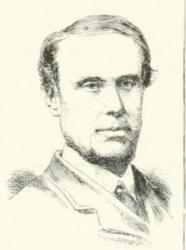Planning worship?
Check out our sister site, ZeteoSearch.org,
for 20+ additional resources related to your search.
- |
User Links
Person Results
George B. Arnold

1832 - 1932 Composer of "ARNOLD" in The Evangelical Hymnal George Benjamin Arnold, born at Petworth, Sussex, England, Dec. 22, 1832. Pupil of S. S. Wesley; Mus. Doc., Oxford, 1861; was organist of St. Columba's College, 1852, of St. Mary's Church, Torquay, 1853, of New College, Oxford, 1860, of Winchester Cathedral 1865. Works: Ahab oratorio, Exeter Hall, London, 1863; The Second Coming of Our Lord, oratorio; The Song of David, cantata; Sennacherib, do., Gloucester, 1883; The Forty-third Psalm; communion Service; Te Deums; Anthems and Motest; Concerted vocal music; Songs, Pianoforte music.
Cyclopedia of Music and Musicians by John Denison Camplin, Jr. and William Foster Apthorp (Charles Scribner’s Sons, 1888)
George B. Arnold
John Richardson
1816 - 1879 Person Name: J. Richardson, 1816-1879 Composer of "ST. BERNARD" in Methodist Hymn and Tune Book
John Richardson
A. Harold Wood
Person Name: Alfred Harold Wood, 1896-1989 Author (v. 3) of "Let him to whom we now belong" in Together in Song
A. Harold Wood
J. E. Lanceley
Person Name: Rev. J. E. Lanceley Composer of "[Let him to whom we now belong]" in Songs of Calvary
J. E. Lanceley
Robert Prescott Stewart
1825 - 1894 Person Name: Robert P. Stewart Composer of "MOUNT CALVARY" in The Methodist Hymnal
Robert Prescott Stewart
Jacob Kimball
1761 - 1826 Person Name: Kimball Composer of "PLAINFIELD" in The American Vocalist Kimball, Jacob. (Topsfield, Massachusetts, February 15, 1761--July 24, 1826, Topsfield). He graduated from Harvard in 1780, studied law, taught school, and tried to make a living at various other occupations, with small success except in the field of music where he was regarded as an outstanding singer, teacher, and composer of his period. He edited Rural Harmony (Boston, 1793) which he followed with Essex Harmony (1800), and Essex Harmony, Part II (1802), which included the only tunes of his own composition which can now be identified as his, except those in the popular Village Harmony (1795) the later editions of which, down to 1821, were probably edited by him. There is evidence that he also wrote poetry, including a number of hymns, some of them perhaps anonymous ones, otherwise unknown, included in the above-mentioned song books. The one hymn which can be attributed to him with assurance is his excellent metrical version of Psalm 65 which Jeremy Belknap included in his Sacred Psalmody (1795), entitled "A New Version" and beginning "Thy praise, O God, in Zion waits." The only other hymn by an American author in Belknap's collection is Mather Byles' "When wild confusion wrecks the air," republished in 1760.
See: Jacob Kimball: A Pioneer American Musician, Essex Institution Historical Collections, XCII, no. 4.
--Henry Wilder Foote, DNAH Archives
Jacob Kimball


 My Starred Hymns
My Starred Hymns


